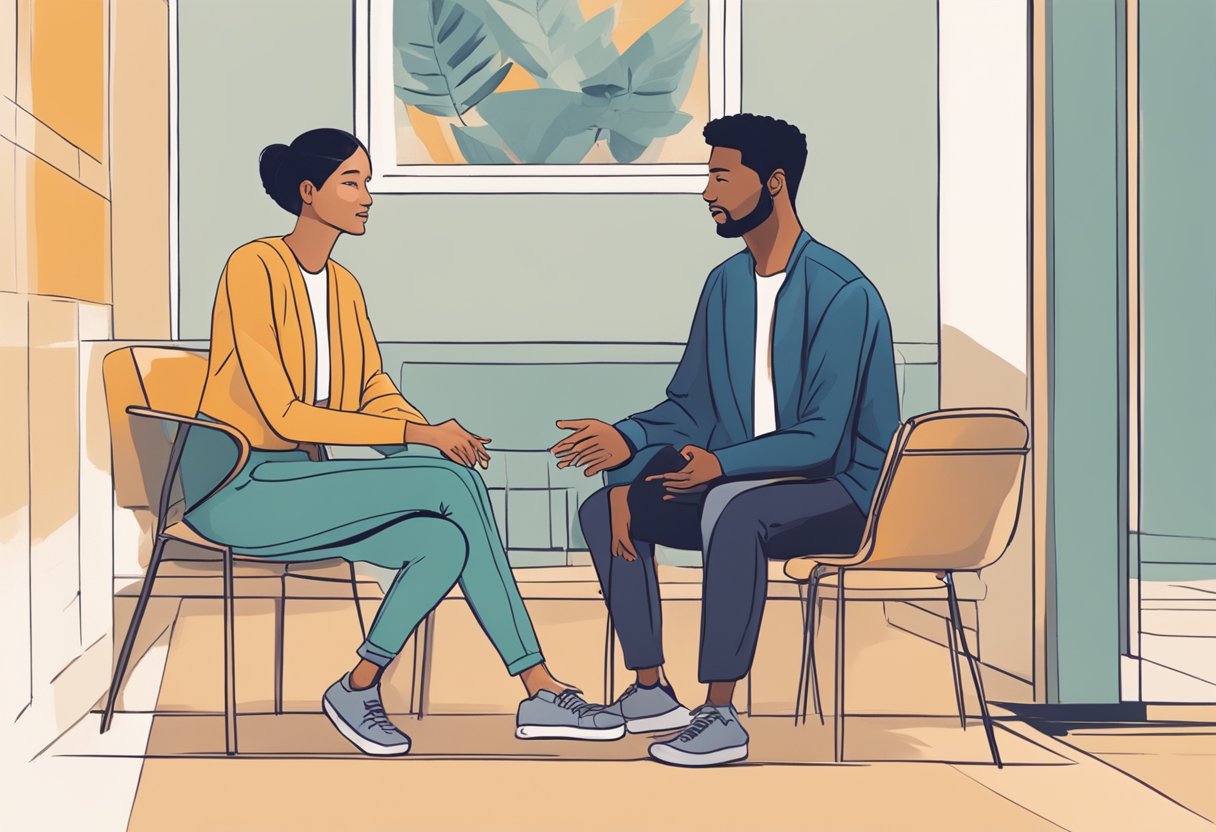Learn how to handle trust issues in an open relationship with our expert guide. Build a solid foundation of trust and communication to keep your relationship strong.
Table of Contents
Introduction – Trust Issues in an Open Relationship
Open relationships are becoming increasingly common, but they come with unique challenges. Trust issues can be particularly difficult to navigate in an open relationship, where partners are free to pursue relationships with other people. Trust is a fundamental component of any healthy relationship, and when trust issues arise, it can be difficult to maintain emotional intimacy, effective communication, or long-term commitment.

Understanding trust issues is the first step to dealing with them in an open relationship. Trust issues can arise from a variety of sources, including past experiences, attachment style, and personal insecurities. In an open relationship, trust issues can be exacerbated by feelings of jealousy, fear of abandonment, or a lack of control. It is important for partners to communicate openly and honestly about their feelings and work together to address any trust issues that arise.
Building and rebuilding trust is key to maintaining a healthy open relationship. This can involve setting clear boundaries, practicing active listening, and being transparent about one’s actions and intentions. Managing jealousy and insecurity can also be important, as these feelings can be a major source of trust issues in an open relationship. Therapeutic approaches, such as cognitive-behavioral therapy or couples counseling, can be helpful in addressing trust issues and improving communication and negotiation skills.
Key Takeaways
- Trust issues can be particularly challenging in an open relationship, where partners are free to pursue relationships with other people.
- Understanding the sources of trust issues and working together to build and rebuild trust is key to maintaining a healthy open relationship.
- Therapeutic approaches, communication skills, and managing jealousy and insecurity can all be helpful in addressing trust issues in an open relationship.
Understanding Trust Issues

Trust is a critical component of any relationship, including open relationships. Trust is defined as the belief that someone is reliable, honest, and has your best interest at heart. On the other hand, mistrust is the opposite of trust and involves the belief that someone is untrustworthy, dishonest, or has ulterior motives.
Defining Trust and Mistrust
Trust and mistrust can be influenced by past experiences, childhood experiences, and traumatic events. When someone experiences a traumatic event, such as infidelity or betrayal, it can be difficult for them to trust again. Additionally, past experiences with untrustworthy people can also lead to trust issues in future relationships.
Common Causes of Trust Issues
Trust issues can also be caused by mental health issues such as anxiety and depression. People with trust issues may struggle with anxiety and may have difficulty forming close relationships. In some cases, trust issues can also lead to conflict, insecurity, and emotional distance.
Signs of Trust Issues in Relationships
Signs of trust issues in relationships include jealousy, possessiveness, and a lack of communication. People with trust issues may also have difficulty being vulnerable with their partner and may struggle to share their thoughts and feelings.
To overcome trust issues in an open relationship, it is important to address the underlying causes of mistrust. This may involve seeking therapy, working on communication skills, and rebuilding trust through honest and open communication.
Related Posts:
The Impact of Trust Issues on Open Relationships

Open relationships require a high level of trust and communication between partners. Trust issues can have a significant impact on an open relationship, leading to jealousy, insecurity, and communication breakdown. Intimacy and vulnerability challenges may also arise due to trust issues.
Jealousy and Insecurity
Jealousy and insecurity are common issues in open relationships, and they can be exacerbated by trust issues. When one partner does not trust the other, they may become jealous or insecure about their partner’s interactions with other people. This can lead to conflict and tension in the relationship.
According to a study published in the Journal of Sex Research, jealousy is a common issue in open relationships. The study found that jealousy was higher among individuals who reported lower levels of trust in their partners.
Communication Breakdown
Trust issues can also lead to communication breakdown in open relationships. When one partner does not trust the other, they may withhold information or avoid talking about certain topics. This can lead to misunderstandings and a lack of intimacy in the relationship.
Effective communication is essential in open relationships, and trust is a crucial component of communication. According to a study published in The Journal of Sex Research, trust was positively associated with communication satisfaction among individuals in open relationships.
Intimacy and Vulnerability Challenges
Intimacy and vulnerability challenges may also arise in open relationships due to trust issues. When one partner does not trust the other, they may struggle to be vulnerable and open with their partner. This can lead to a lack of intimacy and emotional connection in the relationship.
According to a study published in the Journal of Social and Personal Relationships, trust was positively associated with intimacy and emotional connection among individuals in open relationships.
| Source | Key Findings | Related Keywords/Entities |
|---|---|---|
| Journal of Sex Research | Jealousy is a common issue in open relationships. Jealousy was higher among individuals who reported lower levels of trust in their partners. | jealousy, open relationship, trust |
| The Journal of Sex Research | Trust is positively associated with communication satisfaction among individuals in open relationships. | communication, open relationship, trust |
| Journal of Social and Personal Relationships | Trust is positively associated with intimacy and emotional connection among individuals in open relationships. | intimacy, open relationship, trust |
Building and Rebuilding Trust

Trust is a crucial component of any healthy relationship, and this is especially true in open relationships. Building and rebuilding trust requires effort, patience, and dedication from both partners. In this section, we will explore some ways to build and rebuild trust in an open relationship.
Establishing Honest Communication
Open communication is the foundation of any healthy relationship, and it is especially important in open relationships. Partners must be honest with each other about their feelings, needs, and desires. This includes being honest about their boundaries and expectations. Partners must also be willing to listen to each other without judgment and respond with empathy and understanding. Establishing honest communication is key to building and maintaining trust.
According to Psychology Today, rebuilding trust involves “listening to the person’s feelings, empathizing, and showing responsibility for one’s actions.” This means that partners must be willing to take responsibility for their mistakes and work to make amends. They must also be willing to forgive each other and move forward.
Setting Boundaries and Expectations
Setting clear boundaries and expectations is essential in any relationship, but it is especially important in open relationships. Partners must be clear about what is and is not acceptable behavior. They must also be willing to respect each other’s boundaries and expectations. This includes being honest about their own boundaries and expectations and being willing to compromise when necessary.
According to Verywell Mind, partners must be willing to “picking up the pieces, rebuilding trust, rebuilding the relationship, and getting professional help.” This means that partners must be willing to put in the work to rebuild trust and seek professional help if necessary.
The Role of Forgiveness
Forgiveness is a crucial component of rebuilding trust in any relationship. Partners must be willing to forgive each other for past mistakes and work to move forward. This includes being willing to let go of past hurts and resentments and focusing on the present and future.
According to Healthline, rebuilding trust “requires open communication and time.” This means that partners must be patient and willing to work together to rebuild trust over time.
| Source | Key Findings | Keywords/Entities |
|---|---|---|
| Psychology Today | Rebuilding trust involves “listening to the person’s feelings, empathizing, and showing responsibility for one’s actions.” | rebuilding trust, empathy, responsibility, feelings |
| Verywell Mind | Partners must be willing to “picking up the pieces, rebuilding trust, rebuilding the relationship, and getting professional help.” | rebuilding trust, professional help |
| Healthline | Rebuilding trust “requires open communication and time.” | rebuilding trust, communication, time |
Managing Jealousy and Insecurity

Open relationships require a high level of trust and communication between partners. However, trust issues can arise, leading to feelings of jealousy and insecurity. Here are some strategies for managing these emotions and fostering a healthy relationship.
Identifying Triggers
It’s important to identify the triggers that cause feelings of jealousy and insecurity. This may include situations where one partner spends more time with someone else, or when they share intimate details about their experiences with others. By identifying these triggers, partners can work together to avoid them or find ways to manage them.
Coping Strategies
When feelings of jealousy and insecurity arise, it’s important to have coping strategies in place. These may include practicing self-care, such as exercise or meditation, or seeking support from a therapist or trusted friend. Partners may also find it helpful to communicate openly and honestly about their feelings, and to establish clear boundaries and expectations for their relationship.
Fostering Self-Esteem
Low self-esteem can contribute to feelings of jealousy and insecurity in a relationship. Partners can work together to foster each other’s self-esteem by offering compliments and support, and by engaging in activities that build confidence and self-worth. It’s also important for each partner to prioritize their own self-care and personal growth.
According to Verywell Mind, identifying the root causes of jealousy and insecurity can help partners work through these emotions. Choosing Therapy recommends acknowledging and openly talking about jealousy, practicing self-care, and seeking support from a therapist or trusted friend. Finally, Verywell Mind suggests that low self-esteem can contribute to trust issues, and that fostering self-esteem is an important part of building a healthy relationship.
Therapeutic Approaches to Trust Issues

Trust issues can be a common mental health issue that affects individuals in various types of relationships. In an open relationship, trust issues can become more complicated and may require specific therapeutic approaches to address them. Therapeutic approaches can help individuals and couples develop the skills necessary to manage trust issues and improve their relationship.
Individual Therapy
Individual therapy is a common therapeutic approach for individuals struggling with trust issues. A therapist can help an individual identify the root cause of their trust issues and develop coping mechanisms to manage them. Cognitive-behavioral therapy (CBT) is a form of individual therapy that can be helpful in treating trust issues. According to Counselling Directory, CBT helps individuals understand how their thoughts influence their behavior. In the case of trust issues, a thought may be, “I don’t believe she’s been out with friends, she must be cheating on me.” CBT can help individuals challenge these negative thoughts and develop more positive and realistic ones.
Couples Therapy
Couples therapy is a therapeutic approach that can help partners in an open relationship work through trust issues together. A therapist can help both partners identify the root cause of their trust issues and develop communication and problem-solving skills to manage them. According to GoodTherapy, couples therapy can also help partners develop a deeper understanding of each other’s needs, feelings, and perspectives.
Group Therapy and Support Groups
Group therapy and support groups can be a helpful therapeutic approach for individuals struggling with trust issues in an open relationship. Group therapy provides a supportive environment where individuals can share their experiences and learn from others. According to Simply Psychology, group therapy can help individuals develop a sense of belonging and improve their social skills. Support groups, such as those offered by organizations like Psychology Today, can provide a similar supportive and non-judgmental environment for individuals struggling with trust issues.
| Source | Key Findings | Related Keywords/Entities |
|---|---|---|
| Counselling Directory | CBT can help individuals challenge negative thoughts and develop more positive and realistic ones. | Cognitive-behavioral therapy, negative thoughts, positive thoughts |
| GoodTherapy | Couples therapy can help partners develop communication and problem-solving skills, as well as a deeper understanding of each other’s needs, feelings, and perspectives. | Couples therapy, communication, problem-solving skills, understanding |
| Simply Psychology | Group therapy can help individuals develop a sense of belonging and improve their social skills. | Group therapy, support groups, sense of belonging, social skills |
The Role of Attachment Styles in Trust
Trust is a fundamental component of any relationship, especially in an open relationship where partners may have multiple romantic relationships. However, trust issues can arise due to various factors, including attachment styles.
Understanding Different Attachment Styles
Attachment styles refer to the patterns of behavior that individuals develop during childhood to form emotional bonds with their caregivers. These attachment styles can influence how individuals form and maintain relationships in adulthood. The four main attachment styles are:
- Secure attachment
- Anxious attachment
- Avoidant attachment
- Fearful-avoidant attachment
Secure vs. Insecure Attachment
Individuals with secure attachment styles tend to have healthy, stable, and trusting relationships. They are comfortable with intimacy and closeness and believe that their partners are trustworthy. On the other hand, individuals with insecure attachment styles may have trust issues due to past experiences of rejection, abandonment, or neglect.
Attachment Styles and Open Relationships
In an open relationship, attachment styles can play a significant role in the level of trust between partners. Individuals with secure attachment styles are more likely to trust their partners and have healthy relationships, even in an open relationship. However, individuals with insecure attachment styles may struggle to trust their partners and may experience jealousy or anxiety.
According to a Psych Central article, unresolved trust issues can impact every relationship in an individual’s life. Therefore, it is essential to address attachment styles and trust issues to maintain healthy relationships, especially in an open relationship.
| Source | Key Findings | Keywords/Entities |
|---|---|---|
| Psych Central | Unresolved trust issues can impact every relationship in an individual’s life | Trust issues, attachment style, relationship |
| Verywell Mind | Individuals with insecure attachment styles may struggle to trust their partners | Attachment style, trust, insecure attachment |
| Simply Psychology | Individuals with secure attachment styles tend to have healthy, stable, and trusting relationships | Attachment style, secure attachment, trust |
| MindBodyGreen | Attachment styles can be related to trust issues in a relationship | Attachment style, trust, relationship |
Communication and Negotiation Skills
Effective communication and negotiation skills are essential in any relationship, particularly in an open relationship where trust issues may arise. Open and honest communication is the cornerstone of any successful relationship, and it is essential to establish clear lines of communication from the outset.
Effective Communication Techniques
Effective communication techniques include active listening, expressing oneself clearly, and using “I” statements. Active listening involves paying attention to what the other person is saying, asking questions to clarify any misunderstandings, and summarizing what the other person has said to ensure that you have understood them correctly. Expressing oneself clearly involves using clear and concise language and avoiding vague or ambiguous statements. Using “I” statements involves expressing how you feel about a particular situation without blaming or criticizing the other person.
Negotiating Relationship Terms
Negotiating relationship terms is another essential aspect of managing trust issues in an open relationship. Negotiation involves finding common ground and reaching a compromise that works for both parties. It is important to establish clear boundaries and expectations from the outset and to revisit them regularly to ensure that they are still working for both parties.
Resolving Conflicts
Conflict is inevitable in any relationship, and it is essential to have effective conflict resolution skills to manage trust issues in an open relationship. Conflict resolution involves identifying the root cause of the conflict, expressing oneself clearly, and finding a mutually acceptable solution. It is important to avoid blame, criticism, and defensiveness, and to focus on finding a solution that works for both parties.
According to PON – Program on Negotiation at Harvard Law School, building trust in a negotiation requires taking the time to understand the other party’s perspective and culture. Effective communication plays a significant role in building trust in a negotiation, and it is essential to verify whether trust is warranted. Forbes emphasizes the importance of trust in communication and suggests that trust can be built by being transparent, reliable, and consistent. The PON – Program on Negotiation at Harvard Law School also highlights the importance of relationships in negotiation and suggests that effective leadership depends on fostering strong connections.
| Source | Key Findings | Keywords/Entities |
|---|---|---|
| PON – Program on Negotiation at Harvard Law School | Building trust in a negotiation requires taking the time to understand the other party’s perspective and culture. Effective communication plays a significant role in building trust in a negotiation, and it is essential to verify whether trust is warranted. | trust, negotiation, communication |
| Forbes | Trust can be built by being transparent, reliable, and consistent. | trust, communication |
| PON – Program on Negotiation at Harvard Law School | Effective leadership depends on fostering strong connections. | relationship, negotiation |
Maintaining a Healthy Open Relationship
Open relationships require trust, communication, and a willingness to explore new boundaries. Maintaining a healthy open relationship takes effort, but it can be a rewarding experience for both partners. Here are some strategies that can help maintain a healthy open relationship.
Regular Check-ins and Updates
Regular check-ins and updates are essential for maintaining a healthy open relationship. It is important to set aside time to discuss how each partner is feeling and what they need from the relationship. This can help prevent misunderstandings and build trust over time.
According to a Simply Psychology article, couples in open relationships should establish clear rules and boundaries, and regularly update them as needed. This can help ensure that both partners feel comfortable and secure in the relationship.
Balancing Independence and Togetherness
Balancing independence and togetherness is key to maintaining a healthy open relationship. Each partner should have the freedom to pursue their own interests and relationships, while still making time for each other.
According to a Verywell Mind article, couples in open relationships should focus on building intimacy and connection, while also respecting each other’s autonomy. This can help prevent jealousy and insecurity from creeping in.
Long-Term Strategies for Success
Long-term strategies can help ensure the success of an open relationship. This may include setting goals, establishing boundaries, and regularly checking in with each other.
According to a Hello Relish article, couples in open relationships should be honest about their emotional and sexual needs, and establish clear boundaries to feel safe and secure. Additionally, they should be open to discussing issues as they arise, and be willing to make changes as needed to maintain a healthy relationship.
| Source | Key Findings | Keywords/Entities |
|---|---|---|
| Simply Psychology | Establish clear rules and boundaries. Regularly update them. | Open relationships, rules, boundaries |
| Verywell Mind | Focus on building intimacy and connection. Respect each other’s autonomy. | Open relationships, intimacy, connection, autonomy |
| Hello Relish | Be honest about emotional and sexual needs. Establish clear boundaries. Be open to discussing issues. | Open relationships, honesty, boundaries, communication |
Frequently Asked Questions
What are the signs that indicate trust issues within an open relationship?
Trust issues can manifest in many ways within an open relationship. Some of the most common signs include jealousy, insecurity, and fear of abandonment. Individuals with trust issues may also have a tendency to overanalyze their partner’s behavior, become overly possessive, or experience anxiety when their partner is spending time with someone else. 12
How can one emotionally manage being in an open relationship?
Being in an open relationship requires a high level of emotional maturity and self-awareness. Effective emotional management involves setting clear boundaries with partners, practicing open communication, and engaging in self-care activities that promote emotional stability and well-being. 34
What are effective strategies for building trust with a partner in an open relationship?
Building trust in an open relationship requires a commitment to honesty, transparency, and open communication. Some effective strategies for building trust include setting clear expectations, practicing active listening, and being willing to compromise. Couples may also benefit from engaging in activities together that promote emotional intimacy and bonding. 14
How do you approach a relationship when your partner has trust issues?
Approaching a relationship when your partner has trust issues requires patience, empathy, and a willingness to work together to overcome challenges. It is important to establish clear boundaries and expectations, practice open communication, and engage in activities that promote emotional intimacy and bonding. Couples may also benefit from seeking the support of a licensed therapist who specializes in working with individuals with trust issues. 35
Which therapeutic approaches are recommended for overcoming trust issues in relationships?
Therapeutic approaches for overcoming trust issues may include cognitive-behavioral therapy, psychodynamic therapy, and couples therapy. Cognitive-behavioral therapy focuses on identifying and changing negative thought patterns and behaviors that contribute to trust issues. Psychodynamic therapy focuses on exploring the root causes of trust issues and developing strategies for overcoming them. Couples therapy involves working with a therapist to improve communication and build trust within the relationship. 125
What are the common root causes of trust issues in romantic partnerships?
Trust issues in romantic partnerships may be caused by a variety of factors, including past traumatic experiences, attachment style, and relationship history. Individuals who have experienced betrayal or abandonment in past relationships may be more likely to develop trust issues in future relationships. Attachment style, or the way in which individuals relate to others, may also play a role in the development of trust issues. 124
| Source | Key Findings | Keywords/Entities |
|---|---|---|
| Verywell Mind | Trust issues can manifest in many ways within an open relationship | jealousy, insecurity, fear of abandonment |
| Regain | Being in an open relationship requires a high level of emotional maturity and self-awareness | emotional management, open communication, self-care |
| Simply Psychology | Building trust in an open relationship requires a commitment to honesty, transparency, and open communication | clear expectations, active listening, emotional intimacy |
| HelloRelish | Approaching a relationship when your partner has trust issues requires patience, empathy, and a willingness to work together to overcome challenges | clear boundaries, open communication, couples therapy |
| Healthline | Therapeutic approaches for overcoming trust issues may include cognitive-behavioral therapy, psychodynamic therapy, and couples therapy | cognitive-behavioral therapy, psychodynamic therapy, couples therapy |
| Verywell Mind | Trust issues in romantic partnerships may be caused by a variety of factors, including past traumatic experiences, attachment style, and relationship history | past traumatic experiences, attachment style, relationship history |
Footnotes
- Verywell Mind. “Why You May Have Trust Issues and How to Overcome Them.” https://www.verywellmind.com/why-you-may-have-trust-issues-and-how-to-overcome-them-5215390 ↩ ↩2 ↩3 ↩4
- Simply Psychology. “Trust Issues in a Relationship.” https://www.simplypsychology.org/trust-issues-in-a-relationship.html ↩ ↩2 ↩3
- Regain. “How To Help Someone With Trust Issues.” https://www.regain.us/advice/infidelity/how-to-help-someone-with-trust-issues/ ↩ ↩2
- HelloRelish. “Open Relationships 101: How To, Dos and Don’ts and What to Expect.” https://hellorelish.com/articles/open-relationships-how-to-do-donts.html ↩ ↩2 ↩3
- Regain. “How To Fix Trust Issues: Expert Advice For Your Relationship.” https://www ↩ ↩2
